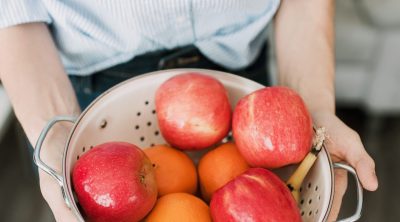I get really jazzed about what spring has to offer: tulips, fava beans, asparagus and ballet flats (finally). But with spring also comes the wave of food and diet trends, and this season, it’s all about the juice cleanses. I’ve gotten tons of questions about juice cleanses from friends and clients wanting to know my thoughts and whether I recommend them. So today we’re talking juice cleansing, addressing some of your questions and deciding whether they’re healthy, or just trendy.
What is a juice cleanse?
Juice cleanses or fasts are just that; a fasting period during which you go juice-only for anywhere between 3 and 60 days. But you don’t drink any kind of juice on a cleanse. You drink freshly pressed vegetable and fruit juices that you can either press yourself or purchase from a juice bar, that conveniently deliver the cold-pressed juices to you. These juice cleanse kits usually come with about 9-12 cups of juice packed in 5 or 6 fashion-forward bottles. There’s usually two green juices, two citrus-based juices, one root vegetable juice and one nut milk to provide some fat and protein.
This popular cleanse provides 1070 calories, 210 g carbohydrate, 14 g protein and 19 g fat for the day. Right out of the gate, the calorie count on this cleanse (which is average for most commercial cleanses, that usually provide between 1000 – 1200 calories) is very low, especially if you’re the least bit active.
If it ain’t broke…
The premise of doing a juice fast is to “cleanse the body from toxin overload.” I use quotation marks here because from a physiological and evidence-based standpoint, there’s no need for us to cleanse our bodies. The problem with buzzwords like detox and cleanse, is that they create confusion about basic principles of human physiology. Our body is well equipped; our skin, our GI tract loaded with healthy bacteria, our lungs, lymphatic system, liver and kidneys already make for a well-oiled, cleansing machine.
Ok…but do they work?
Granted that something doesn’t have to be “necessary” for it to work. I don’t “need” my iPhone, but I definitely benefit from it. Does this hold true for juice cleanses? Can they still be beneficial even if we don’t need them?
Unlike intermittent fasting, which does have some rooting in science, there isn’t a shred of scientific evidence that juice cleanses provide any benefit in ridding the body of toxins. Why not?
When you put together a study to test a hypothesis like this one, you need to be crystal clear on your variables, meaning you need be able to describe and measure them. Unfortunately, the ambiguity of the terms detoxification and toxins, doesn’t lend well to quantitative research. So, I don’t expect any juice cleansing clinical trials in the near future.
Are they healthy?
So if there’s nothing in the scientific literature telling us that juice cleanses provide any benefit, what about those who swear by them? Well, I can’t base my recommendations on anecdotal reports. I have friends who have done juice fasts and loved them and others who didn’t make it past the first day from nausea, headaches, fatigue and vomiting. And this is besides the crankiness you (and those around you) have to endure when you forego food.
So in case you’re wondering how you will react on a cleanse, your guess is as good as mine since results can range from highly energized to slightly sick and bed ridden.
While these symptoms may not pose a huge health risk for a healthy person, there are some people who should definitely avoid cleansing. Juice cleanses are not balanced, providing almost 80% of your energy in the form of carbohydrate, making your blood sugar levels soar with insufficient protein, fat or fiber to dampen the response. This is not suited for anyone who is pregnant or breastfeeding for children or anyone who is diabetic or with any other medical condition.
Are they good for weight loss?
I think it’s important to point out that juice cleanses were never intended for weight loss. Juice fasts began as a more spiritual experience, bringing awareness to the body, allowing you to be more appreciative and mindful of your food. Alas, building greater awareness is rarely what motivates people to go on a cleanse. When I’m asked about a cleanse, it’s either as a quick-fix for weight loss or to “even out” an unhealthy eating streak.
While you’ll probably lose some weight from going juice-only, the restrictive nature of cleanses makes them inefficient for lasting weight loss. Especially if followed for long periods of time since the low protein content is inadequate for maintaining muscle mass, a key factor for lasting results.
My biggest issue with juice cleanses.
For the record, I juice or blend daily and usually enjoy a green juice or green smoothie as my morning snack (and also have my eye on this slow juicer). Juices and smoothies as supplements to a real food diet, yes. But juice-only cleanses remain fad diets in my book.
Some proponents argue that going on a cleanse makes them learn to appreciate fruits and vegetables and leads to a healthier lifestyle. And for them, I’m glad. But my concern is for those who turn to cleanses to “even out” an unhealthy eating streak. There is no band-aid for a bad diet and there isn’t a 3 day solution to an unhealthy lifestyle. But more importantly, turning to a cleanse to reconcile a binge, is akin to a purge of any sort. The binge-cleanse cycle is a slippery slope, and also my main concern with the growing trend. So while some may say juice cleanses are a “gateway to health”, I’d refute they can be a gateway to pretty disorded eating patterns.
The right way to detox.
What your body needs more than another quick-fix, is actual change. Your body will reap the most benefit from progressively and consistently reducing processed foods, eating real food and juicing everyday. There are cleanses or detoxes out there that do rely on eating good, whole foods without resorting to juice-only deprivation, The Foodtrainers Doable detox or Bon Appétit’s Food Lover’s Cleanse are some good examples.
The bottom line: if you cut caffeine, sugar and processed foods from your diet and increase vegetables, fruit and water intake, there is no doubt you will feel great. Your body NEEDS for all of these changes to be made. Your body DOES need a minimally processed diet, for us to cut down on sweets and go easy on the cocktails. Your body DOES need an abundance of vegetables and fruit every single day. Is it ok to drink green juices or smoothies on a daily basis? Yes. Green light. Go for it. Just make sure you also enjoy a diet of real food, too.
Ever done a juice-only cleanse? What are your thoughts on cleanses, healthy or trendy?
Photo source





Such a great post!
I feel like this is such a hot topic lately!
I completely agree with you. I will occasionally juice in addition to my current intake, but never have juiced alone.
Thanks Kristen, hot topic for sure. Glad I’m not alone in enjoying real foods with my juice : )